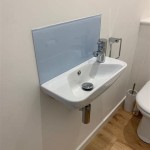Regrouting a Bathroom Tile Floor: A Comprehensive Guide
Regrouting a bathroom tile floor is an essential maintenance task that can significantly enhance its appearance and longevity. While it may seem like a daunting task, it is something that can be done with some careful planning and a bit of elbow grease. Here's a comprehensive guide to help you through the process:
1. Preparation
Before you start regrouting, it's crucial to prepare your bathroom and gather the necessary tools. Here's what you'll need:
- Grout removal tool or oscillating multi-tool
- New grout
- Grout float
- Bucket and sponge
- Caulk gun (optional)
- Safety glasses and gloves
Ensure that the bathroom is well-ventilated and remove any fixtures or obstacles that may hinder your work.
2. Removing the Old Grout
Using a grout removal tool or an oscillating multi-tool equipped with a grout blade, carefully remove the old grout from the joints between the tiles. Be gentle and avoid damaging the tiles. Work in small sections, starting from one corner of the floor and gradually moving towards the other end.
3. Cleaning the Joints
Once the old grout is removed, use a sponge and bucket filled with warm water to clean the joints thoroughly. Remove any remaining grout residue, dirt, or debris. Allow the joints to dry completely before proceeding to the next step.
4. Mixing the New Grout
Prepare the new grout according to the manufacturer's instructions. Typically, this involves mixing the grout powder with water until you achieve a smooth, spreadable consistency. For a more durable and waterproof grout, consider using an additive such as latex or epoxy.
5. Applying the New Grout
Using a grout float, apply the new grout evenly into the joints between the tiles. Hold the float at a 45-degree angle and press the grout firmly into the joints. Avoid overfilling the joints, as this can make them prone to cracking.
6. Smoothing the Grout
Using the edge of the grout float, smooth the grout lines by running it along the joints at a 90-degree angle. This will remove any excess grout and create smooth, uniform lines.
7. Cleaning Up
After applying the grout, use a damp sponge to wipe away any excess grout from the tiles. Rinse the sponge frequently in clean water to prevent staining. Allow the grout to set for the time specified by the manufacturer.
8. Sealing the Grout (Optional)
To enhance the grout's durability and resistance to moisture, apply a grout sealer. This will help prevent staining, mold, and mildew growth. Follow the manufacturer's instructions for application and allow it to dry completely.
Tips for Success
- Use a contrasting grout color for a more dramatic effect.
- If you're not confident in your ability to remove the old grout without damaging the tiles, consider hiring a professional.
- Allow ample time for the grout to set properly. Rushing the process can compromise the grout's strength.
- If you notice any cracks or gaps in the grout after it has set, apply a small amount of fresh grout and smooth it out.
Regrouting a bathroom tile floor is a rewarding task that can transform the appearance of your bathroom and protect it from moisture damage. With patience, attention to detail, and the right tools, you can achieve professional-looking results that will last for years to come.

How To Regrout Tiles

How To Regrout Tile In Your Kitchen Bathroom And Beyond

How To Regrout Bathroom Tile In 5 Easy Steps True Value

Can I Regrout My Shower Floor Here Are 3 Reasons You Should Not The Grout Medic Of Central New Jersey

How To Regrout Tiles Without Removing Old Grout

Bridgewater Nj Regrouting Recaulking The Grout Medic
How To Regrout Bathroom Tiles A Complete Guide Timesproperty

Tile Regrouting Rescue

Six Easy Steps To Regrout Bathroom Tiles For A Show Home Finish Prevent Mould Express Co

How To Regrout Tiles Step By Guide
Related Posts







